Tatty scraps of paper bearing something written in German long ago, in pencil or crayon, with abundant crossings-out… I had filed these away not realising their importance. I’d taken them to be the fruits of someone’s Sunday afternoon copying out a very long poem.
Then last year I gave them a second glance. There was unmistakably a Star of David drawn on one page. Then – how could have I missed it? – the inscription ‘Irma Kuhn B09’.
Irma Kuhn was the elder sister of my grandfather Hans Neumeyer. The mystery figure – my mother and uncle didn’t tell me anything about her. All I knew was that she used to visit the family from time to time and she eventually went blind and at the age of 68 was deported from a Jewish nursing home in Munich (Hermann-Schmid Strasse 5) in 1942 to Theresienstadt. She perished there the following year.
I asked the Theresienstadt Memorial Museum what ‘B09’ might mean. They replied: “Presumably it is the designation of the room at the attic B (there were also attics A and C) in the house Q 319 where she died. House Q 319/L 404 was paying for a home for the blind.”
I sent a copy of the poem – or poems as there now seemed to be two of them – to historian Lauren Liederman, who is of American nationality but lives in Görlitz with her husband and two young children and is dedicated to preserving the Jewish history of Görlitz (where my grandmother Vera and great aunts lived with their parents, the Ephraims, up to 1922). Lauren passed it onto someone who could decipher the handwriting, and then set about translating it.
And then a very excited message from her: “OMG Tim! Irma’s poem! Had me crying!”
Then we realised it was an artefact from Theresienstadt: the poem was written by Irma, and at the end dedicates it to Hans, her brother. Both were blind, so Irma dictated it to someone called Rina.
Erstmals nach persönlichem Diktat
Zu Papier gebracht im Ghetto Theresienstadt unweit Prag
Nach zehnmonatiger Gefangenschaft von deiner Schwester
Rina
(Von der Rimis)
Written for the first time according to personal dictation. Put on paper in the Theresienstadt Ghetto not far from Prague, after ten months of imprisonment, by your sister
Written out by Rina (of the Rimis)
Then the question arose how the poem survived. I got the answer in June, when among the papers and letters received from the extraordinary stash found in the Hellman’s basement in Sweden (see previous post) was a letter from Alois Weiner, who had befriended Hans’ during their incarceration in Theresienstadt. Alois survived the Holocaust and wrote to Dela Blakmar, my grandfather’s secretary and lover, after the war. I had previously only seen Dela’s typed out copy of the letter, which omitted the opening paragraph that said the only things that survived of Hans’ from Theresienstadt were photos of this children (my mother and uncle) and two poems. Alois kept those items and passed them on to Dela. So that is how the poems got to us.
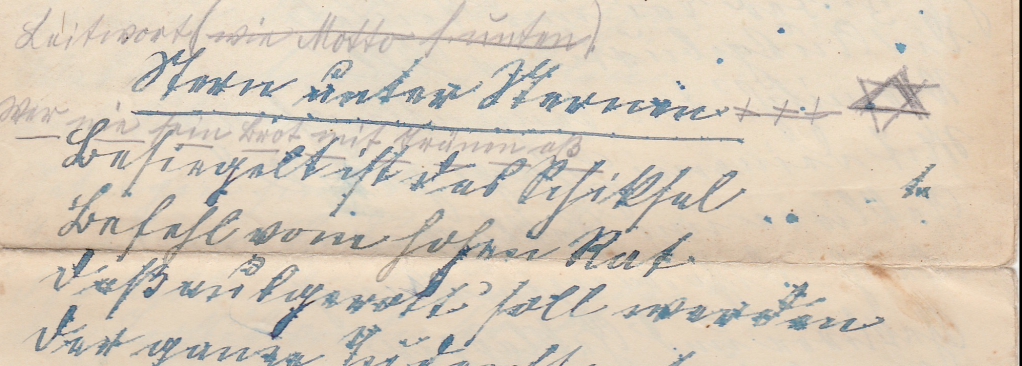
The poem
Actually it’s one poem but written out twice – the first time with lots of corrections and amendments, and the second time as a fair copy. It is titled Stern unter Sternen (“Star among Stars”).
What surprised me was its heartfelt Jewish sentiment. I didn’t realise Irma and Hans were such close adherents to the religion, nor that Irma was apparently a woman of great intellect. And clearly they found each other in Theresienstadt. Hans married my grandmother Vera in 1920 – she was the daughter of a Lutheran Christian-Jewish couple, and was herself a devout Lutheran. Hans and Vera brought up their children Ruth (my mother) and Raymond as Lutherans. Hans didn’t attend a synagogue – as a blind man it would have been very difficult travelling to Munich for the purpose (there was no synagogue where they lived, in the town of Dachau). But he still regarded himself as a Jew: ‘As I am a Hebrew, the political situation in Germany has made impossible any activity as a music teacher as well as a composer ‘.
Did Irma perhaps write the poem intending Hans to set music to it? He was surrounded by a coterie of music students (see an earlier post on this blog), who took lessons from him and called him ‘the professor’ – they would have been willing to help.
I present it here in its original German, so you can get an idea of its scansion and rhyme, and then with an annotated literal translation by Lauren. Huge thanks to her for helping identify this artefact.
The photos are all ones I took on a visit to Theresienstadt in 2001, when we lit candles in memory of our family members in the crematorium.
Note: the first version below is the German version. If you have your browser preferences set to translate to English automatically then it may appear in auto-translated English, so I advise you turn that option off on your preferences while reading this.
Stern unter Sternen
1.
Besiegelt ist das Schicksal
Befehl vom hohen Rat
daß nit gerett’ soll werden
Der ganze Judenstaat.
Schon graut’s in grauen Mauern
schon grinst Gevatter Tod.
Vernichtung ist die Losung
Vernichtung das Gebot
Die Sense umgeschultert
So naht der Sensenmann
Er kürt sich seine Opfer
Und legt die Sichel an
2.
Wir zahlen die Tribute
Zoll der Vasallenzeit
Wir zahl’n mit Herzensblute
das Blut zum Himmel schreit.
3.
Sah’ Ritter, Tod und Teufel
die Ausgeburt der Höll,
Vermisch’ den Sensensingsang
Mit deinem Hohngegröhl
Geklirre und Geklapper
Welch Dissonanzenklang
Geklirre und Geklapper
zum letzten Abgesang.
4.
Dann meist’re deine Arbeit
Mal’ deine Stigmen hin
Und drück die Totenmale
auf jede bleiche Stirn.
Wir stehen still und weinen
die Tränen löschen aus
Wir stehen still und beten
Verklärung wird daraus.
5.
Getragen sind die Särge
zu eb’ner Erd’ geschickt
Der Rabbi der Gemeinde
Die Trostesworte spricht.
(Diese erste Strophe 5 ist durchgestrichen. Es folgt eine neue)
5.
Wir hungern, darben, frieren,
Erleb’n der Klagen zehn.
Was könnte außer Polen
Uns übles noch geschehn
Getragen sind die Särge
Zu eb’ner Erd’ geschickt
Der Rabbi der Gemeinde
Die Trostesworte spricht.
6.
Wir stehen an den Särgen
Darob das Bahrentuch
Geschmückt im Stern der Sterne
Sind wir nicht reich genug?
Er strahlt mit gold’nem Glanz
Im Dunkeln umsomehr
Er strahlt mit den Milliarden
Am weiten Äthermeer.
7.
Das Antlitz gegen Osten
Die Sonne im Zenit
Rotgold in Sonnbrandsschwaden
die Erde überglüht
Wir schauen Gottes Wunder
voll Inbrunst im Gemüt
Bis das die Sonne unter
Fernab der Tag entflieht.
8.
Dann falt ich meine Hände
weiß sie von Sünde rein
beseligt wonnetrunken
hüllt mich ein Schlummer ein
Wir werden nicht vergehen
Wir werden fortbestehen
Wir werden weiterleben
Und Leben um zu sehn.
9.
Mir träumt ein Mene-Tekel
Ich deut’ der Runen Schrift
Im Schemen ewiger Jude
zerbricht Judäa nicht.
Ich höre Sphfärenklänge
Vernimm der Harfe Lied
Und schmück mich mit dem Sterne
In dem Judäa siegt.
Er führt uns einst von Hause
Er führt uns einst zurück
Ein Herd, ein Tisch, ein Lager
Sei unser höchstes Glück.
10.
Und Friede, Friede, Friede, verbreitet sich im Raum
Und Friede, Friede, Friede bedeutet dieser Traum
Und Friede, Friede, Friede hat uns der Herr geschenkt
In Allmacht, Gnade, Güte,
behüt, geschirmt, gelenkt
Wer nie im seinem Leben
Um Freiheit wurd gebracht
Kennt nicht der übel größtes
Kennt nicht der Freiheit Macht.
11.
Allgütiger, Allvater, du hörtest unser Flehen
Wer so wie wir erniedrigt,
Den kannst du nur erhöhen
Wohlan denn, Schwestern, Brüder
In Ghettos nah und fern
vernehmt die große Kunde
Es naht der Tag des Herrn
12.
Auf Gletschers höchsten Höhn
Klafft drohend Spalt und Kluft
Lawinen donnern krachen
Auf eines Hamans (?) Gruft.
Wir aber Schwestern, Brüder
Wir rüsten jetzt zum Fest
Das Fest zum Wiedersehen
Das Gott uns feiern lässt.
13.
Nehmt Euer Hoheitszeichen
Aus König Davids Hand
Und zeugt euch seiner würdig
Und seinem Unterpfand.
Im Geist gebannt was immer
uns zugefügt der Mob
So roll’n die Ghetto Ghettobilder
Vorbei im Zoetrop
14.
Geknebelt und geknechtet
Wir wanken, weichen nicht
Wir trotzen den Gewalten
In tiefster Zuversicht
15.
Entfremdet und entrechtet
Volk ohne Raum und Brot
Verharrend bis ins letzte
In schwerster Schicksalsnacht
16.
So wählt ich jene Weise
So seelenvoll versiehts,
Zu Leitwort und Geleite
Zum Ghettoklagelied.
17.
Wer nie sein Brot mit Tränen aß
Wer nie in kummervollen Nächten
Auf seinem Bett weinend saß
Der kennt euch nicht ihr himmlischen Mächte
AMEN
Literal translation in English:
Star Among Stars
1.
Sealed is the fate
The order from the high council
is that there shall be no salvation
for any of the Jewish people.
Already the grey walls are shuddering
and the Grim Reaper leers.
Destruction is the watchword
Destruction is the order
With a scythe around his shoulder
the Grim Reaper approaches.
He chooses his victims
And brandishes his scythe.
2.
We pay tribute
Duty of servitude
We pay with blood of our heart
Our blood cries to heaven.

3.
I saw the knight, death and devil
the spawn of hell,
Mingle the scything song
With your mocking roar
Crash and clatter
What dissonance sound
Clattering and crashing
until the very last swan song.
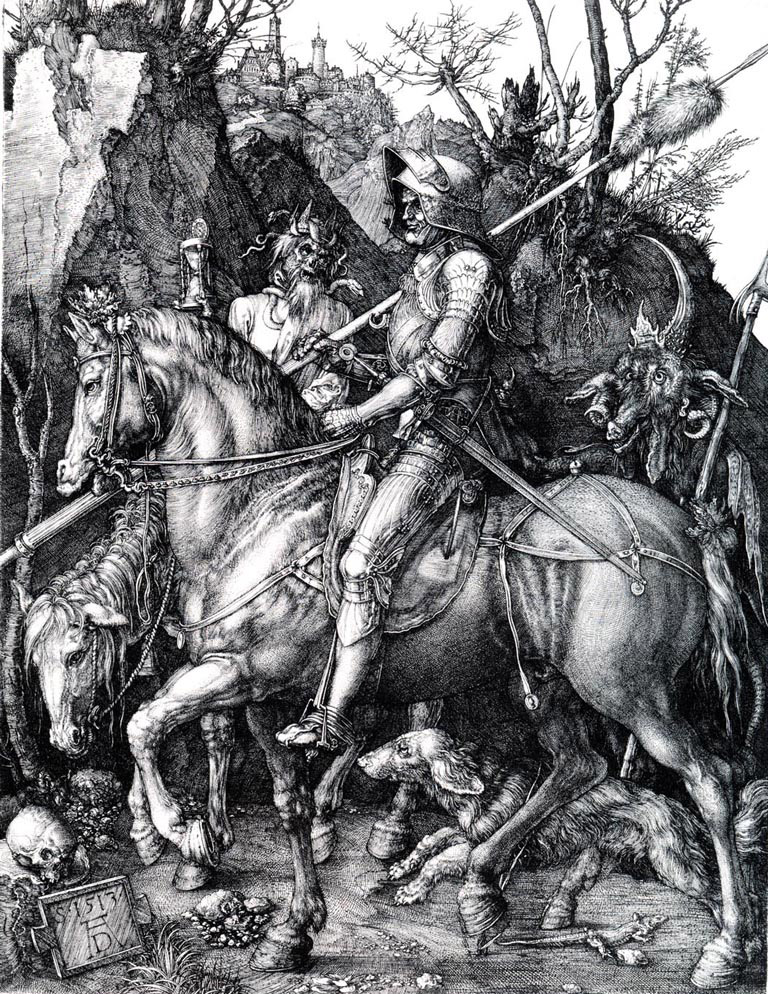
4.
Then mostly your work
Paint your stigmas
And press the death marks
On each pale brow.
We stand still and weep
The tears extinguish
We stand still and pray
Transfiguration forms from it.
5. (this verse was crossed out)
Carried are the coffins
Sent into the ground
The rabbi of the congregation
Speaks the words of comfort.
5.
We hunger, we starve, we freeze,
Suffering lamentations times ten.
What else could happen to us
What evil can still befall us
The coffins are carried
Sent into the ground
The rabbi of the congregation
Speaks words of comfort.

6.
We stand by the coffins
Whereof the pall
Adorned in the star of stars
Are we not rich enough?
It shines with golden brilliance
In the dark all the more
It shines with the billions
On the wide ethereal sea.
7.
Facing towards the east
The sun at its zenith
Red gold in sunburn swathes
The earth glows
We watch God’s miracle
Full of fervour in the mind
Until the sun sets
Far away the day flees.
8.
Then I fold my hands
I know them clean from sin
Blissfully drunk with joy
A slumber envelops me
We will not perish
We will endure
We will live on
And live to see.
I dream of a Mene-Tekel
[Mene-Tekel: Old Testament reference to the words that appeared on the wall during Belshazzar’s Feast (Daniel 5:25), interpreted by Daniel to mean that God had doomed the kingdom of Belshazzar]
I read the runes’ writing
In the scheme of eternal Judea
Judea does not break.

9.
I hear the sounds of the spheres
I hear the harp’s song
And I am adorned with the star
Within which Judea triumphs.
It leads us once from home
And will lead us back once more.
To our hearth, our table, our camp
It is our highest happiness.
10.
And peace, peace, peace, will spread in the room
Peace signifies this dream
It is peace that the Lord has given us
In omnipotence, grace, goodness,
protected, shielded, guided
He who never in his life
Was deprived of freedom
Does not know the greatest evil
He does not know the power of freedom.
11.
Most gracious Father of all, you have heard our plea
Those who are humiliated like us,
Only you can lift them up
Come then, sisters, brothers
In ghettos near and far
Hear the great news
The day of the Lord is near
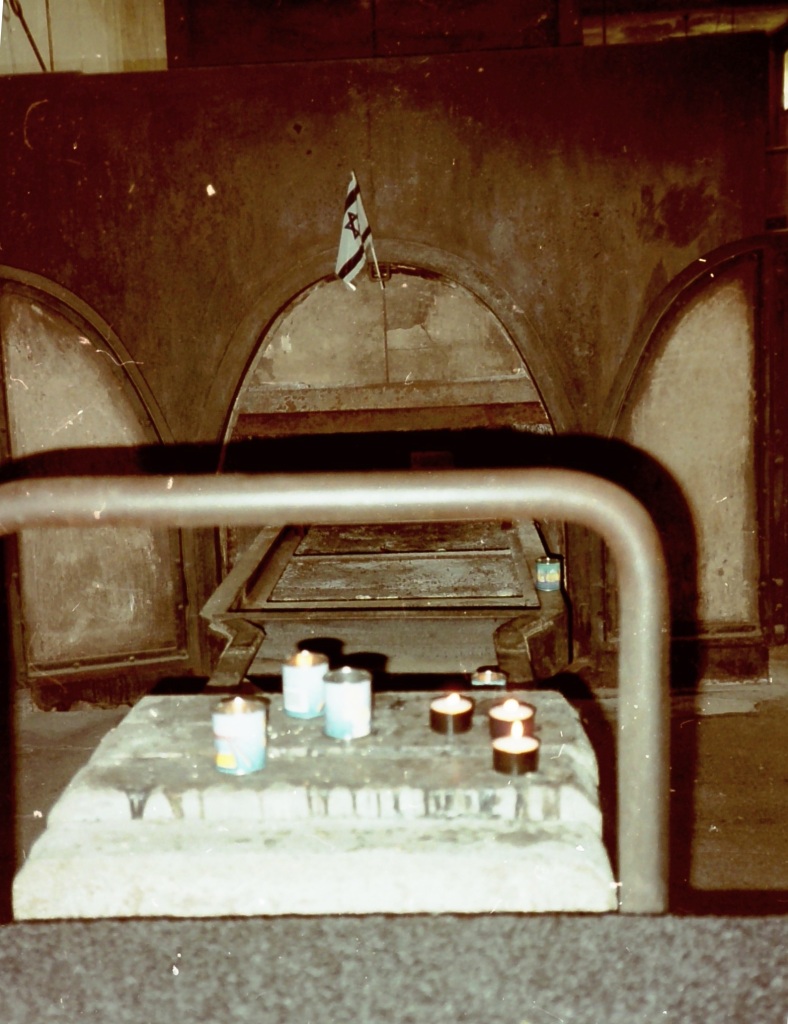
12.
On the glacier’s highest peaks
Gaps and chasms are threatening to open
Avalanches will crash
On Haman’s tomb.
[Haman’s tomb- a Haman who is the main antagonist in the Book of Esther for which Purim is celebrated. He sought to annihilate the Jews.]
But we sisters, brothers
We now prepare for the feast
The feast of reunion
That God makes for us to celebrate.
13.
Take your sovereign sign
From King David’s hand
And bear witness to him
And his pledge.
In the spirit we are bound
through whatever will be inflicted on us by the mob
So rolls the ghetto, and its horror
Like in the wheel of the zoetrope
[A zoetrope was a machine invented in 1834 by William George Horner, was an early form of motion picture projector that consisted of a drum containing a set of still images, turned in a circular fashion in order to create the illusion of motion.]
14.
Gagged and chained
We waver, yet do not yield
We defy the forces
In deepest faith
15.
Alienated and disenfranchised
People without room and bread
Persevering to the last
In our heaviest night of fate
16.
So I choose that way
So soulfully do I do it,
To guide and escort others
Through our ghetto lament.
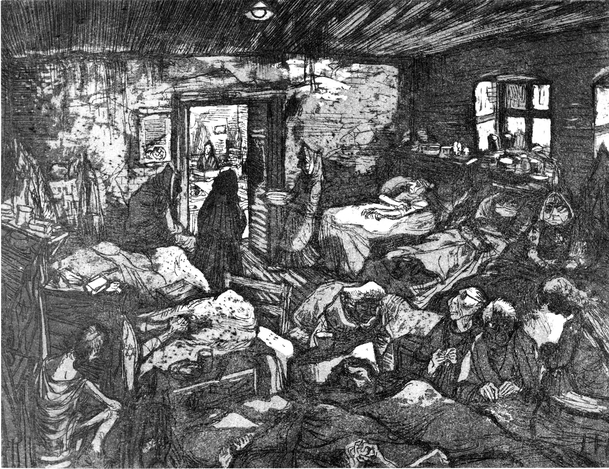
17.
He who never ate his bread with tears
He who never in sorrowful nights
Sat on his bed crying
He does not know you, and your heavenly powers.
AMEN
A literary – or musical – quotation
The words of the last four lines are Goethe’s, not Irma’s. She is quoting from his work Wilhelm Meister. Those words were set to music by Schubert, as part of a song cycle Gesänge des Harfners aus Wilhelm Meister (Songs of the Harpist from Wilhelm Meister). It seems very likely that song was familiar to both of them.
There is a second verse which Irma omits:
The original:
Ihr führt ins Leben uns hinein,
Ihr lasst den Armen schuldig werden,
Dann überlasst ihr ihn der Pein:
Denn alle Schuld rächt sich auf Erden.
The translation:
You bring us into life;
you deem the poor man guilty,
then you leave him in his agony:
for all guilt is avenged on earth.
To hear Schubert’s song, in a poignant performance by Dietrich Fischer-Dieskau, click here.

Special thanks to Lauren Leiderman for her help.
If anyone has any extra information or observations about the wording in this poem please let me know (timothy.locke@talktalk.net), or add a comment below.
Words and text copyright Tim Locke, 12.8.2022


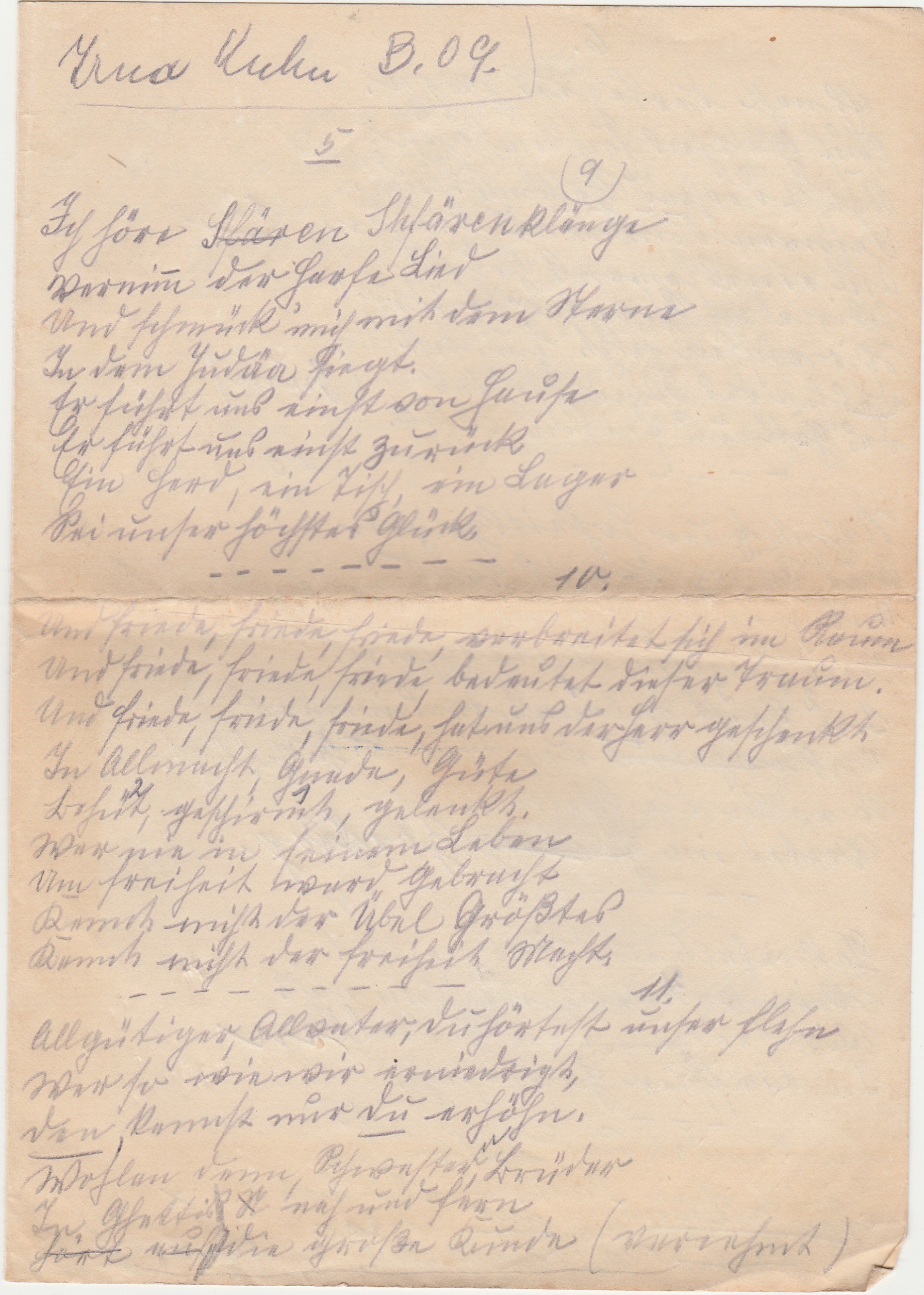


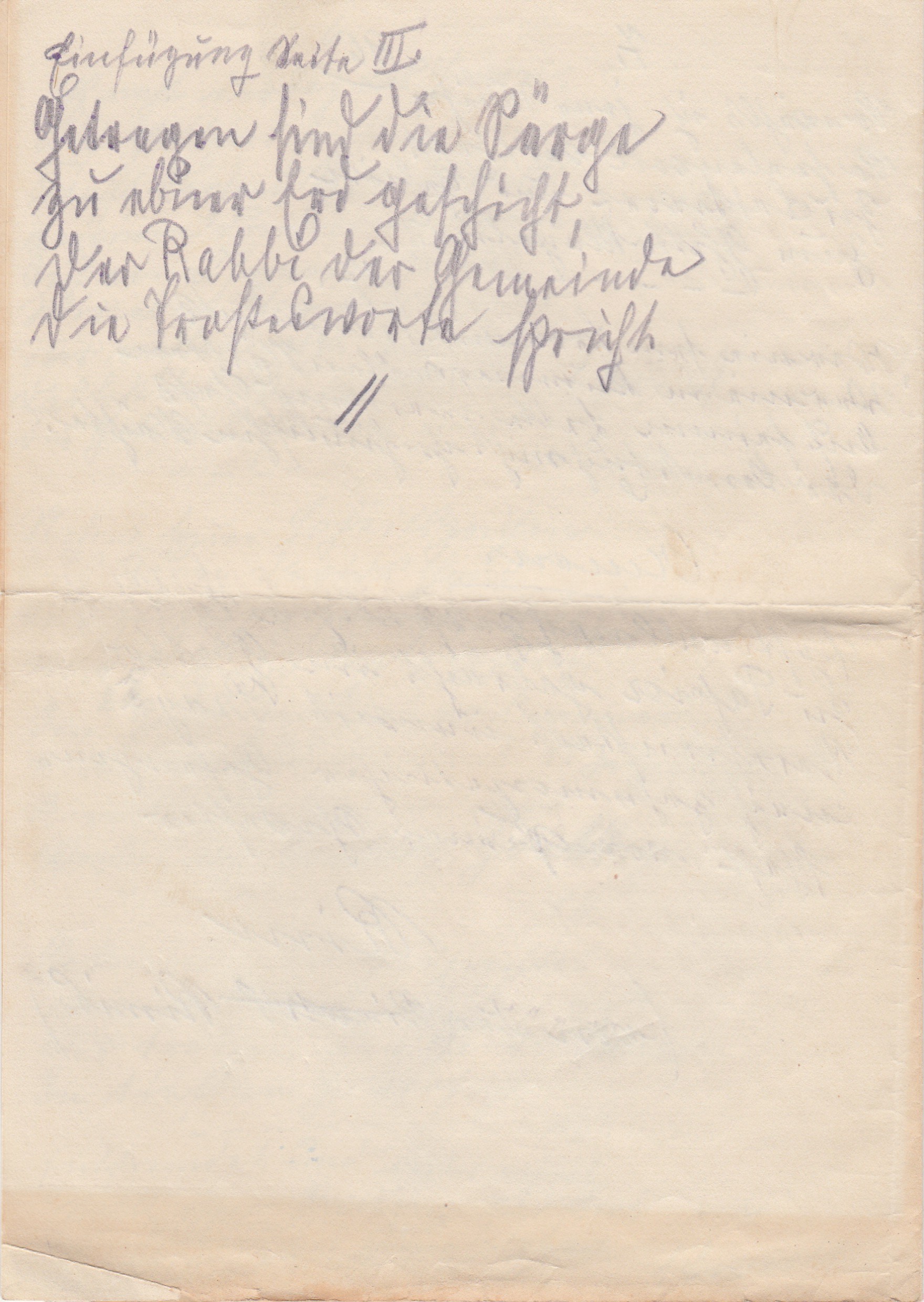
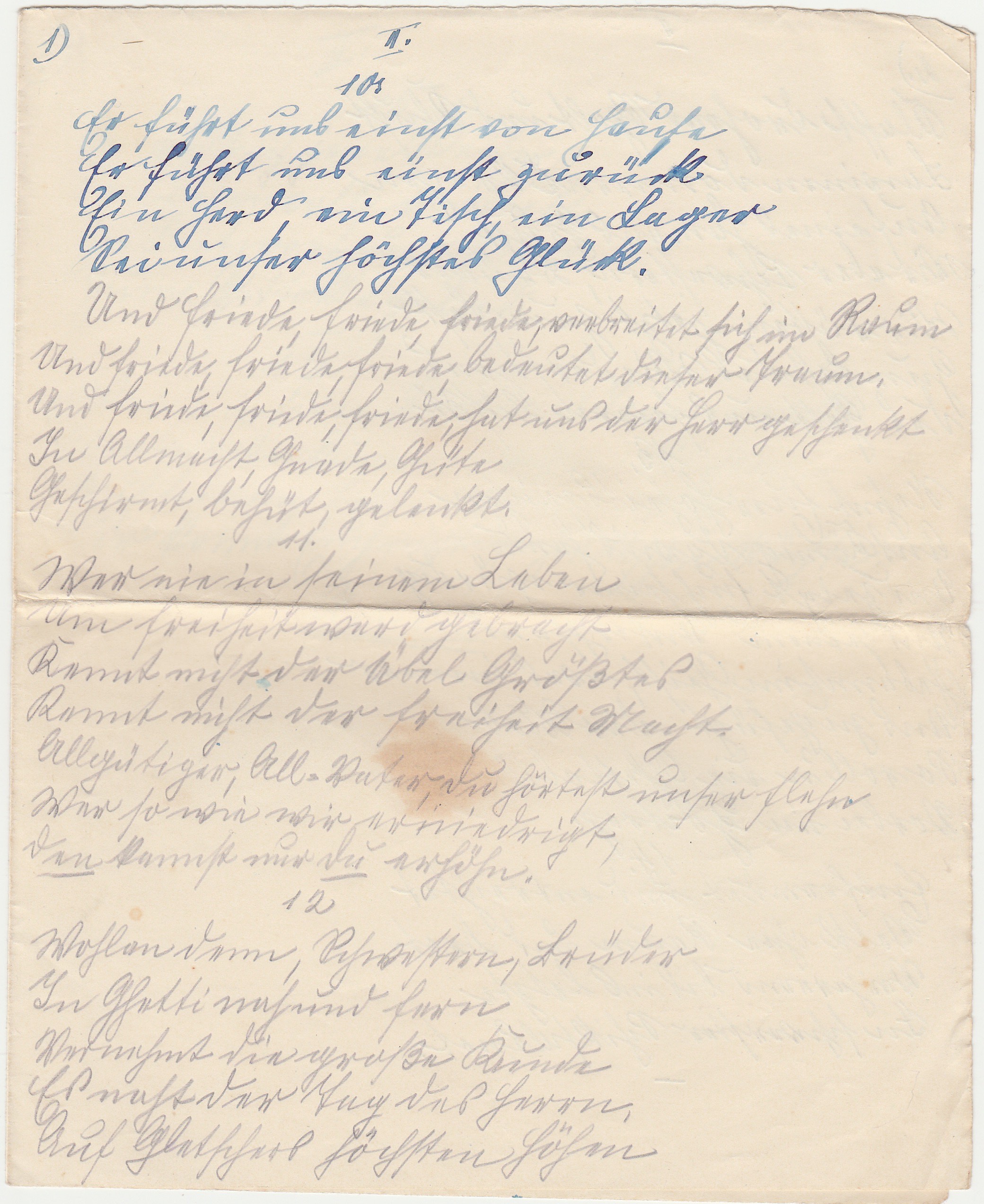


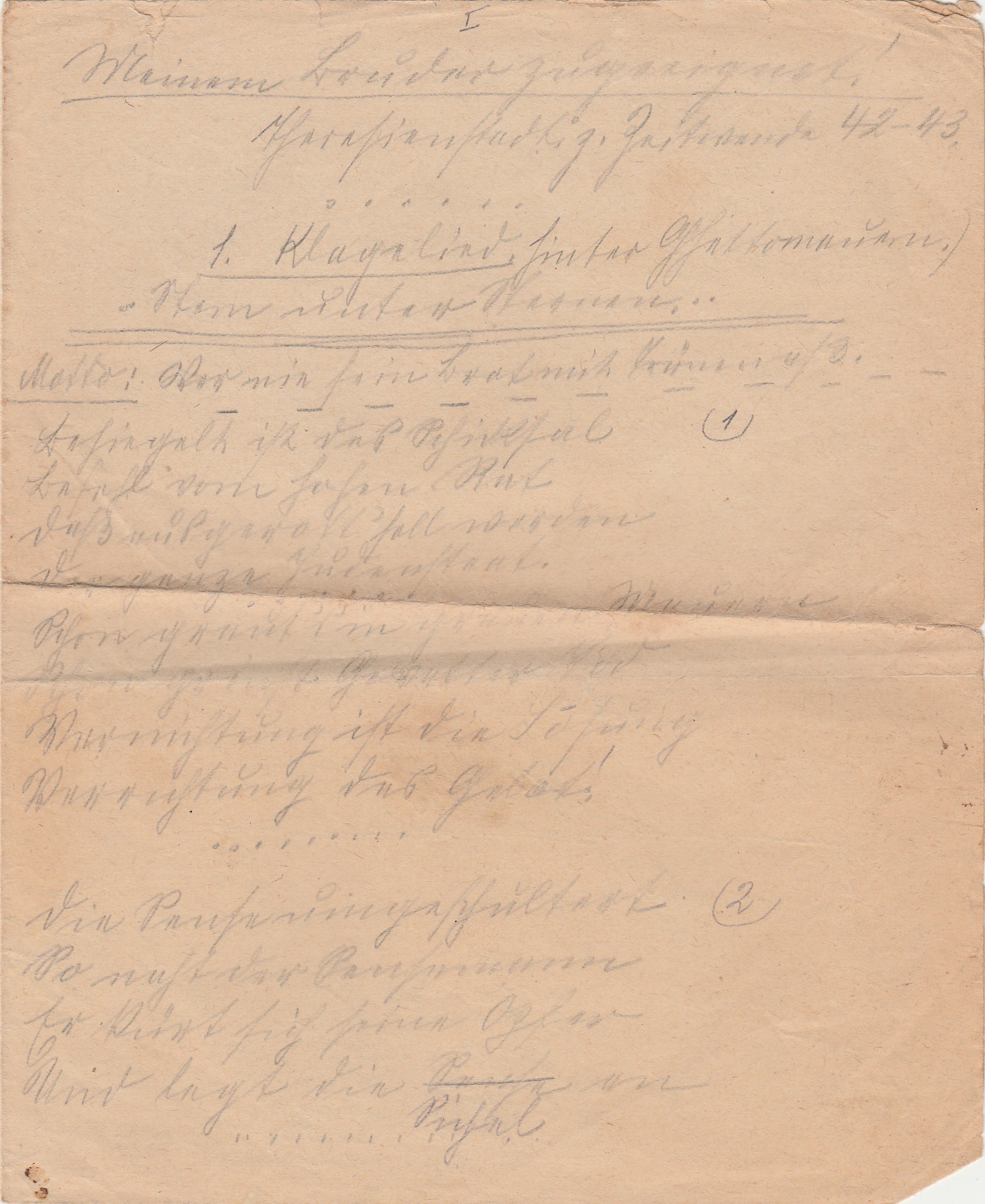

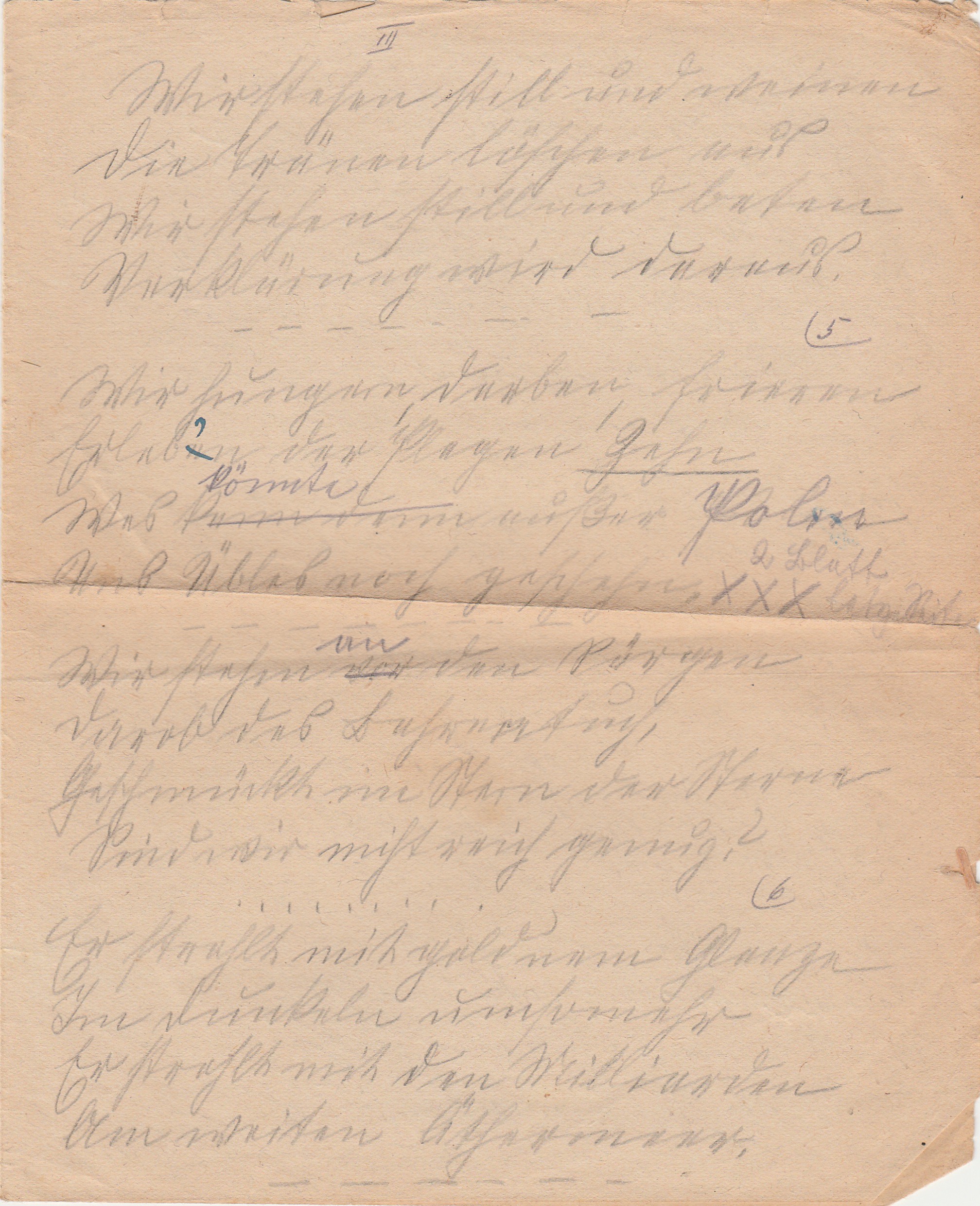
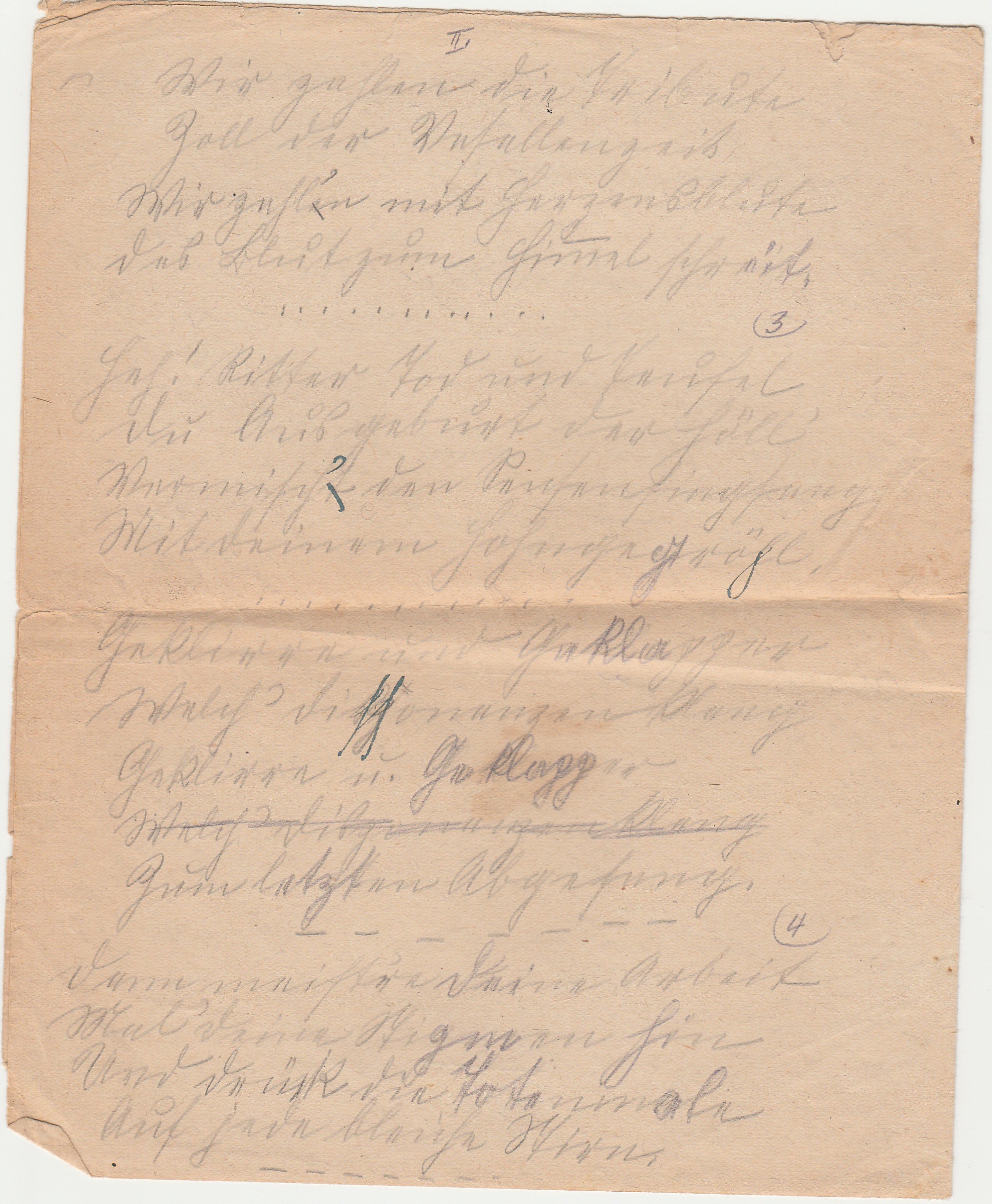
Pingback: Hans Neumeyer and Irma Kuhn: Sharing Gifts of Music and Poetry in Terezin - Butterflies in the Ghetto